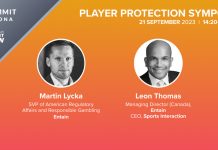The Martin Lycka Safe Bet Show returned this month and Arthur Paikowsky, President of the International Centre for Responsible Gambling (ICRG), was the man in the hot seat.
In the podcast, the pair discuss Paikowsky’s life in fundraising and the work of the ICRG in progressing the industry’s knowledge of responsible gambling.
Paikowsky has spent over four decades working as a fundraiser for multiple organizations, in which time, he has raised over $1 billion. Lycka started by asking how fundraising has changed throughout Paikowsky’s career.
RG donors experiencing some fatigue
He noted that the main difference is that the industry has become more technology-driven, which he believes has not been for the better. Later in the podcast he also touched on how technology has led to donor fatigue due to people being bombarded daily with requests for money.
“When you talk to people in the fundraising world and you say how many of these hits do you get on your computer every single day [and] somebody’s asking you for money? And how many then do you respond to in a positive way? The answer is almost always, I get a lot and I don’t respond to any of them. And so I think actually what I’ve tried to explain when I’m given an opportunity to talk about the state of fundraising today versus the way it was decades ago, is that all this is really doing is creating donor fatigue, and that’s a bad thing,” he stated.
Paikowsky also talked about how, over time, it has got to the point where everyone he deals with now is younger than himself which he says can both be a positive and negative.
“When you deal with people that are younger than you, it mostly sort of falls on the two extremes. The one extreme is and this is the bad extreme is you’re a dinosaur. You’re yesterday’s news. You don’t use technology the way we do because we grew up with it. That’s the one side. The other side is you’re respected and revered for the knowledge and the accomplishments that you’ve had over almost now,” he added.
The chat then moved on to his work at the ICRG and how he helped to turn it from a struggling organization to the winner of Charity of the Year at ICE in 2024.
Paikowsky has focused on creating awareness about ICGR
Lycka praised his guest on boosting the charity’s fundraising efforts from $1.3 million to $3.4 million and asked Paikowsky to go talk about what he has changed since joining the organization in 2021.
Paikowsky said that the main thing he had to do was get the word out in the industry about the ICRG as he found when talking to people initially he found that many were unaware of the organization and its work despite being around for the last 25 years.
The pair then began talking about the current studies that the ICRG is working on and Lycka asked how the ICRG can counter the fact that many in the industry see research as something that takes a long time to take place.
Responding to this, Paikowskhy conceded that there was no way to speed up the research process, however, what can be accelerated is the time it takes for “knowledge translation” to take place. He defined knowledge transition as how long it takes for what has been learned to be translated into a format that can be understood by the industry.
Evaluating how the industry is handling responsible gambling
Lycka concluded the conversion by asking what Paikowsky thought the industry as a whole was doing well and not so well regarding responsible gambling.
Paikowsky acknowledged that there were lots of people within the industry doing good things however on the whole he believes that there is still not a “universal acceptance” of the need within the industry to own the problem.
“You have designated people, particularly in the larger companies, who are supposed to be addressing this and they’re great, they’re passionate, they’re talented, they tend to be younger people. But at the end of the day, if you really want to impact this, it has to get to the C-suite. It’s got to be embraced by the top decision-makers within the industry,” he said.














